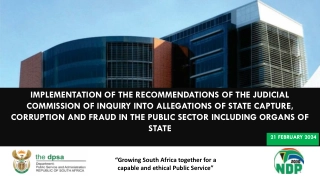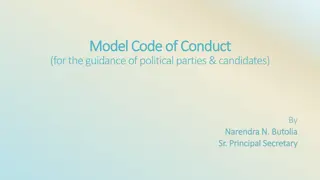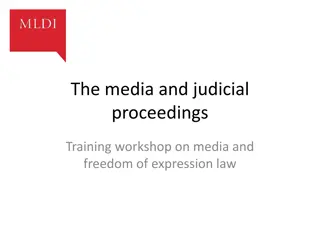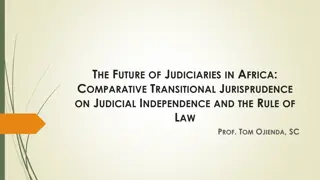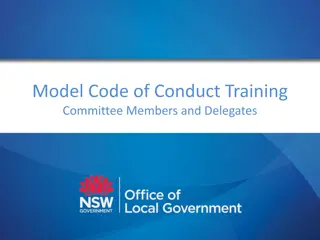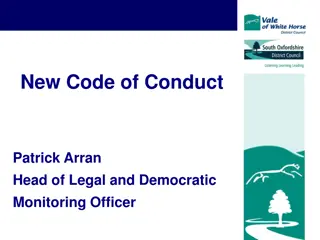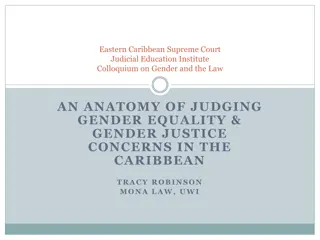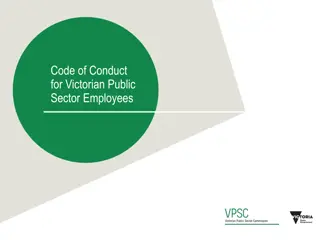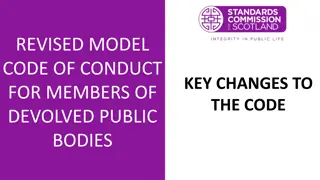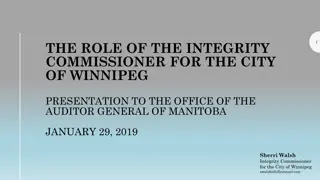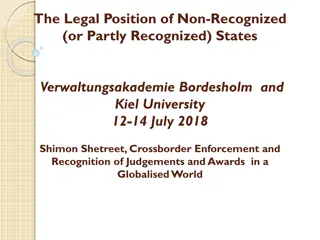Ensuring Judicial Independence and Accountability: Model Code of Judicial Conduct
An overview of the history and significance of the Model Code of Judicial Conduct, focusing on judicial independence, integrity, and accountability. The discussion highlights the crucial role of an impartial judiciary in upholding the rule of law and the efforts made to update and maintain ethical standards for judges. The balance between judicial independence and accountability is explored within the context of the legal system.
Download Presentation

Please find below an Image/Link to download the presentation.
The content on the website is provided AS IS for your information and personal use only. It may not be sold, licensed, or shared on other websites without obtaining consent from the author. Download presentation by click this link. If you encounter any issues during the download, it is possible that the publisher has removed the file from their server.
E N D
Presentation Transcript
Judicial Independence and the Rule of Law -- A Panel Discussion Dedicated to the Late Mark I. Harrison Judicial Independence in the Model Code of Judicial Conduct Myles V. Lynk Professor Emeritus, Sandra Day O Connor College of Law, Arizona State University, Phoenix, AZ January 27,2022 An independent, fair and impartial judiciary is indispensable to our system of justice. Model Code of Judicial Conduct, Preamble, 1.
Mark Harrison and the Model Code of Judicial Conduct Mark Harrison was a renowned legal ethics expert, both in Arizona and nationally. In 2003, at a time when state Codes of Judicial Conduct were under attack for being too stringent on the limitations imposed on judges and judicial candidates in public elections, in violation of the First Amendment, the American Bar Association appointed a special Joint Commission to Evaluate the Model Code of Judicial Conduct. It was to review and update the Model Code in light of these concerns, while ensuring that the Code continued to require the independence, integrity and impartiality of judges. This was a tall order!
Mark Harrison and the Model Code of Judicial Conduct Not surprisingly, given how important this task would be, then ABA President Dennis Archer, of Michigan, chose Mark to Chair the Commission. The Commission had eleven members. There were also numerous liaisons, advisors and staff. It worked feverishly for three years, and in February 2007 it presented a revised version of the Model Code to the ABA s House of Delegates for adoption. The revisions that Mark and his Commission proposed were adopted unanimously by the ABA House of Delegates!
Judicial Independence and Judicial Accountability In the brief time I have today I will review, very briefly, the history of the Model Code and then look at the provisions of the current version of the Code that relate to the independence of judges. As we go through this program, you should consider the interaction and perhaps even tension, between the ideal of judicial independence, and a countervailing notion of judicial accountability. Is one of the reasons so many states have an elected judiciary is so that the judges will ultimately be accountable to their community? And is that not perhaps a constraint on judicial independence? Where should the balance be drawn?
A (Very) Brief History of the Model Code of Judicial Conduct The American Bar Association publishes the Model Code of Judicial Conduct. Most states, including Arizona, have adopted most of its provisions. The Code replaced the Canons of Judicial Conduct that were first adopted by the ABA in 1924. The Canons were the work of as Commission on Judicial Ethics chaired by Chief Justice William Howard Taft. It is said that a motivating factor for the adoption of the Canons came in 1920 when United States District Judge Kennesaw Mountain Landis supplemented his $7,500/yr. judicial salary with a $42,500/yr. income to serve as the first Commissioner of Major League Baseball!
A (Very) Brief History of the Model Code of Judicial Conduct The Model Code was first adopted in 1972. It then provided seven Canons to replace the 36 in the original Canons of Judicial Ethics. From the very beginning, a principal goal of both the Canons and the Code has been to promote and protect the independence of the judiciary. The Model Code has been amended at least seven times. The amendments in 2007 were the result of the work of the Commission that Mark chaired and were among the most significant.
Challenges to State Codes of Judicial Ethics However, In the early 2000s State Code provisions that primarily applied to judicial election campaigns were struck down by the courts as unconstitutional. The Supreme Court of the United States decision in Republican Party of Minnesota v. White, 536 U.S. 765 (2002), struck down provisions of Minnesota s Code that were deemed to infringe on a judge s First Amendment right to comment on contested political issue in during a judicial election campaign.
Challenges to State Codes of Judicial Ethics The U.S. Court of Appeals for the 11thCircuit, in Weaver v. Bonner, 309 F3d 1312 (11th Cir. 2002), held that Georgia s restrictions on an elected judge s personal solicitation of campaign contributions and prohibition against judicial campaign speech that was a misrepresentation, were unconstitutional. And in 2003, a decision of the United States District Court for the Northern District of New York struck down numerous provisions of the New York Code as unconstitutional, not just those regulating a judge s political activity but also provisions designed to ensure judicial independence, impartiality and integrity in general. Spargo v. New York Comm. on Judicial Conduct, 24 F.Supp.2d 72 (2003).
Joint Commission to Evaluate the Model Code of Judicial Ethics It was in light of these developments that in 2003 the ABA appointed the Joint Commission to Evaluate the Model Code of Judicial Conduct, with Mark Harrison as its chair. This Commission, under Mark s direction, worked hard to develop the current, revised ABA Model Code of Judicial Conduct, which was adopted unanimously by the ABA House of Delegates at the ABA Midyear Meeting in February 2007. As Mark said in his Statement when he presented this revised Code to the ABA House of Delegates: An independent, impartial judiciary is indispensable to our system of justice. Equally important is the confidence of the public in the independence, integrity and impartiality of our judiciary as an institution.
Judicial Independence in the Model Code What does the Model Code now say about judicial independence? Not surprisingly, the Model Code is focused on what a judge or judicial election candidate should or should not do, and not on the external pressures that can be brought to bear on a judge. The Code can only impart to judges the admonition that they must act with impartiality, independence and integrity in the discharge of their duties. The definition of Independence in the Code is that it means a judge s freedom from influences or controls other than those established by law.
Format of the Model Code of Judicial Conduct The Model Code now contains four Canons, not seven. The Canons state overarching principles of judicial ethics that all judges must observe. Scope, para. [2] Each Canon is followed by a set of Rules. [A] judge may be disciplined only for violating a Rule. Scope, para. [2] [T]he black Ietter of the rules is binding and enforceable, Scope, para. 6], but: The Rules should not be interpreted to impinge upon the essential independence of judges in making judicial decisions. Scope, para. [5].
Judicial Independence in the Model Code, Canon 1 Canon 1 states: A judge shall uphold and promote the independence, integrity, and impartiality of the judiciary, and shall avoid impropriety and the appearance of impropriety. Rule 1.2 under Canon 1 restates this requirement with the addition that a judge, shall act at all times in a manner that promotes public confidence, that the judiciary possesses these qualities.
Judicial Independence in the Model Code, Canon 3 Canon 3 states: A judge shall conduct the judge s personal and extrajudicial activities to minimize the risk of conflict with the obligations of judicial office. Rule 3.1(C) under Canon 3 prohibits a judge form participating in activities that would appear to a reasonable person to undermine the judge s independence, integrity or impartiality.
Judicial Independence in the Model Code, Canon 3 Rule 3.12 under Canon 3 permits a judge to accept reasonable compensation for permitted extrajudicial activities, unless such acceptance would appear to a reasonable person to undermine the judge s independence, integrity or impartiality. Similarly, Rule 3.13(A) under Canon 3 prohibits a judge from accepting any gift, loan, bequests, benefit or other thing of value if acceptance is prohibited by law or would appear to a reasonable person to undermine the judge s independence, integrity or impartiality.
Judicial Independence in the Model Code, Canon 4 Canon 4 is the Canon that deals with judicial elections. It now provides: A judge or candidate for judicial office shall not engage in political or campaign activity that is inconsistent with the independence, integrity, or impartiality of the judiciary. Rule 4.2(A)(1) under Canon 4 provides: A judicial candidate in a partisan, nonpartisan, or retention public election shall act at all times in a manner consistent with the independence, integrity and impartiality of the judiciary. Of course, if a charge is brought against a judge for violating this provision, it is still up to a court to determine what political and campaign activities are inconsistent with judicial independence, integrity or impartiality.
Conclusion The Model Code reminds judges that independence is a judicial virtue, and they should conduct themselves so as to embrace it. But it does not provide either specific guidance as to what they should do, or specific prohibitions about what they should not do. And while the other two virtues highlighted in the Code impartiality and integrity are consistent with, they are not the same as, independence. Two questions: Does judicial independence promote judicial integrity and impartiality? Is it consistent with judicial accountability?


